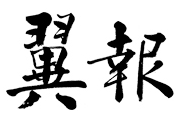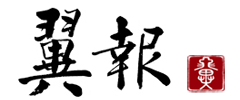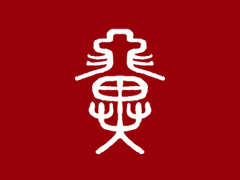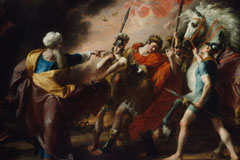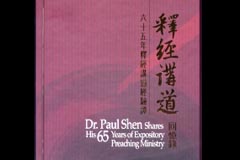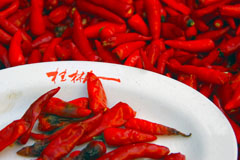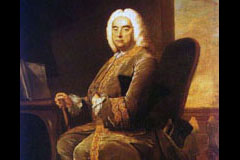集中營記(四)
越營奔向自由
一天,早晨集合點名,大家互相悄聲傳告了一件驚人的消息,說是名叫狄藍和恒安石的兩人相偕逃離了俘虜營。我聽了,便止不住地心跳。我扶着一同伴的手臂,止不住的跳上跳下。試憶他們的面孔,竟記不起來。據說兩人剃髮光頭,中國人打扮。可是牆頭上高架着電網,怎能越牆而不觸電身亡呢?
老師和年長的孩子們對此皆噤若寒蟬。逃亡的後果必然招致日本人的報復。
點名的時刻拖得特別長。照單查問,定要找出這兩人是誰來。岔子一發生,軍犬全部放了出來。日軍找出來逃亡的兩名是何人以後,同房間的九名單身漢被執,關在教堂中,嚴加拷問,被拘禁了好多天。亡羊補牢,已走的決找不回了。
此後,集合點名時的氣氛與以前大不相同。從前點一次就得,現在點兩次才散隊。日本兵既喊叫又肆罵,在營牆前挖掘了一條深十尺寬五尺的壕溝,中間加立一道電網,休想再會有人越牆而逃。
狄藍在戰前任職一家英國煙草進口公司,恒安石任北平天主教立的輔仁大學教授,1981至1985年曾擔任美國駐華(中共)大使。(據恒大使電話相示:大使任內約六年,於1985自國務院退休,現居馬利蘭洲,擔任一些學術界的諮詢或顧問的工作。狄藍戰後奉派印度,任職大英煙草公司,目前居住孟買。據山東抗戰史:濰縣俘虜營成立後,山東挺進軍第十五縱隊,派出一名精通英語的王紹文用入營傳道當掩護,作初次聯絡。因被日軍發覺,第二次由其夫人楊瑞蘭前往。第十五縱隊初為王尚志任司令,自他被俘後,始由王豫民繼任。王豫民初擬修築一條飛機跑道,計劃解放俘虜營,然終因人數太眾婦孺尤多的緣故而罷論。狄藍與恒安石兩人冒險逃奔自由之日是在1944年六月間,此後即留在第十五縱隊駐軍區域擔任與盟國的聯絡工作直到勝利。─譯者)

日軍在營內營外的監視臺
多年以後,我才得聞他們逃走的真相。原來那晚日本兵在換崗後,在人不知鬼不覺的剎那間,他兩人爬上監視臺,依外面預定的接迎時間自臺上越牆而逃。和外面的聯絡進行久,抗日部隊就在五十英里的鄰近出沒,時常有被徵僱的苦力,修理匠或挑糞便的工人,利用工作出入之便,雙方秘密傳遞着暗碼或信號。
這種聯絡方式,他們圈內人戲稱之為“竹製的電臺”,一切消息和行動是密不外宣的。某次,日崗兵在一名苦力身上搜出信件來,他們就拖之進入營房將他打個半死,後來這人就不見了。又一次,營外的同盟分子私運食品入內,因越牆而失足。及至崗兵發現,他迅驚逃,躲避不及,觸電而死。死者屍身懸留電網上大半日,旨在示眾,令人驚心動魄。
在雙方通訊艱困的環境下,他們更加小心。通常的辦法是,取薄綢上寫密語,搓成小丸,包以避孕用橡膠套,塞在攜帶人的鼻腔或含之於口,入營工作時吐於指定地點,圈內人拾取後交付譯員譯出。
說來算是件諷刺也屬可笑的事。凡來自外面的消息逐一被一份旨在宣傳,經日本當局細心竄改北京出版的英文報紙所證實,真是不打自招。就憑他們誇耀的戰果,在某某地區或海域,打沉了盟國船隻幾艘和打落多少飛機,便知戰事的中心已經逼近日本土:吉爾伯,馬紹爾群島,以至關島,菲島,琉璜島,大琉球等。我們所得的消息全部正確,日本正繼續吃着敗仗中。
對某些人來說,盟國步步取勝反爾增添了他們的愁腸。問題是,日本人若預知自己必敗已成定局,對所有俘虜是否將施行姦殺的手段來洩忿怒呢?他們會不會以盟國俘虜的安危為質,對盟國停止轟炸日本土地提出要挾呢?好多人在沉默無言中的憂苦是不言而喻的。
我們這些孩子卻在想另一方面。和我們混熟了,一向態度友好的日本兵,在日本戰敗後倘若效法武士道的精神真的自殺,那才是件可悲的事。一些熟悉日本古風的煙台孩子擺出姿勢來,表演怎樣刀入腹部,開膛作三角形,把最後一刀刺向要害心臟。或許日本兵會將我們這些女孩子帶上監視臺,巧妙,而細心地墜下牆外,使我們重獲自由,然後舉行自戳的儀式。想到這些,我不禁心驚膽寒。
老師對我們說明,種種臆測皆不足以阻礙我們課程方面的進行。芝罘學校向有“蘇彝士運河以東最好的英文學校”之聲譽,目前任何發展都不足以令學校的標準減低。往年,六年級(等於美國高中最高班)讀畢,即舉行“牛津考試”,及格後可逕投入英本土任何大學,不必再經考試。若不入大學,證書有助於就業。

芝罘學校校徽
(篆畫“芝罘校友”)
老師重申政策:所有學生每天必須上課不輟,定須經過牛津考試,務求及格。
在熱不可當的溽暑下,我們坐在蓆子上學拉丁文同根源的動詞,學習猶太宗教史與弗爾集勒(公元前一世紀羅馬皇帝奧古斯督時代的文豪,著有田園詩集和歷史十二冊。─譯者)在戶外樹蔭下讀法文課。六年級的學生每天除了集合點名,洗滌,洗廁所,清除垃圾,加上司廚房爐灶工作外,還要忙着應付考試。
1943年的暑季八月,十一名學生應考,全部合格列榜。1944年,大姊凱琳和其他十三名也通過了考試。1945年十一名學生應試,僅九名及格。戰終,牛津大學認可所有的考試,核發了證書。(芝罘學校自1881年─光緒七年創設迄今,肄業生估計萬人以上,畢業生逾兩千五百,由於第二次大戰,正如本文所述,學校自煙台遷濰縣集中營。戰後,繼有中國內戰及大變動初在上海復校,後遷姑嶺,再遷上海以至九龍。此後因形勢所迫,分在日本,菲島,泰國,臺灣,馬來,星島先後設校。除於後來將臺灣和泰國兩地結束外,今日尚存四處,即日,菲,星,馬。芝罘校友會設於第一次世界大戰之前,今日有四個會,即北美,設於1908年會址在多倫多,英,澳,紐各地。校友間的聯誼和團結是罕見的,北美應為總會,繼續出版半年刊問世。─譯者)
戰前,在華北各地基督教這個圈子裏,第一流的教育師資可說是人才濟濟。他們除了參與正式授課外,更設成人教育班:會計,木工等,語言學如中文,日文,蒙古文和俄文。又舉行講習會:航海,美術,歷史等。還有人人都可參加晚上舉行的討論會,氣氛活躍,節目生動,科學與宗教議題最屬熱門,一般惟理智是賴,非加證實即不相信的人與司天主教,基督教職的神學家對創造神蹟復活等問題開舌戰。
星期日即禮拜天清晨有天主教的彌撒聖禮,十一時有聖公會和聯合會堂的崇拜。晚禱的節目則着重歌詩。每屆復活節,於晨曦微露時即開始崇拜和紀念節目。
濰縣集中營的社會是熱鬧而複雜的。有醫院,小化驗室,為老人,病人專設的小鍋廚房。壘球(球比棒球軟而大)協會下有天津虎隊,北平黑豹隊,神甫隊等。在暖季時,每天有人下場練習。還有那骯髒的一面是孩子們不曉得的:妓女,酒徒,吸毒的,遊手好閒的不良青年,小偷,扒手,專偷廚房的飯食,將別人搓好正在暴晒中的煤球給偷走。
一個現代化都市所具恥辱和光輝的兩面:在我們這圍牆之內,一百五十與二百碼長寬之間,已經表現無遺。
有人在教堂的地下室,找到一架陳舊不堪的鋼琴,經過修理,成了營內用十二具樂器組成交響樂團的裝飾和支柱,銅管樂由基督教救世軍的隊員擔任,木管樂器由天津歌舞團的團員包辦,大小提琴則有來自各地不同年齡和行業的人,至終組成一支很具規模的管絃樂隊,常常奏出令人振奮的音樂來。

營中的“救世軍”管樂隊
還有一歌詠隊,經常演唱村謠,小曲,情歌,甚至古典派作曲:韓德爾的彌賽亞,孟德爾遜的以利亞,司泰奈的十字苦架。更有由經驗宏富的老手組成的話劇社。蕭伯納劇本安德魯克萊與獅子之演出是他們的拿手好戲。社員將紅十字會贈與罐頭食品的空盒子收集起來,為劇中的十名羅馬士兵做好了甲冑。
假座教堂裏的演出節目終年不輟。歡娛中的觀眾可以暫忘卻那些警犬,鐵刺電網,臭廁所,和飢腸轆轆的熬煎。(下期續)![]()
A Song of Salvation at Weihsien Prison Camp
Mary Taylor Previte
IV
We listened wide-eyed to the whisper that passed from mouth to mouth one day at roll call: “Hummel and Tipton have escaped!”
My heart pounded against my ribs as I grabbed Podgey Edwards and started jumping up and down. I tried to recall what Hummel and Tipton looked like. Shaved bald and tanned brown like Chinese, someone said. Chinese clothes. But how in the world, I wondered, did they get over the electrified wire atop the camp wall without getting killed?
Our teachers and the older boys were more subdued. Escape would mean instant reprisals.
Roll call that day dragged on and on. With Hummel and Tipton missing, the guards’ count failed to tally, and when the Japanese realized what was wrong the commandant unleashed the police dogs. And Japanese soldiers promptly arrested the nine remaining roommates from the bachelor dormitory and locked them up in the church for days of ugly interrogation. But nothing worked. Hummel and Tipton were gone.
Roll call was never the same after that. Instead of one, we now had two roll calls a day. Japanese guards cursed and shouted. They counted and recounted us each time. They also dug a monstrous trench beyond the wall, 10 feet deep and five feet wide, and beyond that they strung a tangle of electrified wire. No one would ever escape again.
Laurance Tipton had been an executive with a British tobacco importing firm. Arthur Hummel Jr. had been a professor of English at Peking’s Catholic University; years later, he would serve the U.S. ambassador to China, from 1981-1985.
Not until years later did I learn the story of their escape. Shortly after the nightly changing of the guards, in a prearranged plan with Chinese guerrillas, they had gone over the wall at a guard tower. For the rest of the war, maneuvering in the hills within 50 miles of Weihsien, they employed Chinese coolies—either repairmen or “honey-pot men” who carried out the nightsoil from our latrines and cesspools—to smuggle coded messages in and out of the camp.
This was our “bamboo radio,” known only to the camp’s inner circle. It was a deathly dangerous business. The Japanese had once found a concealed letter on a Chinese coolie as they were checking him before entrance into the camp; they dragged him into the guardhouse and beat him until he was unconscious. He was never seen again. Another Chinese confederate who was passing black-market supplies over the wall to hungry prisoners slipped, in his hurry to get away as the guards approached, and was electrocuted on the wire that crisscrossed the wall. The Japanese left his body hanging there most of the day, as a grim warning.
News from the “bamboo radio” was delivered, therefore, with extreme care. A message would be written on the sheerest silk, wadded into a pellet, placed inside a contraceptive rubber and then stuffed up the nose or inside the mouth of a Chinese workman. Once inside the camp, at a prearranged spot, the coolie would clear his sinuses and spit out the news. Insiders then pounced on the spit wad and took it to the translator.
Ironically, the Japanese themselves helped confirm the accuracy of some of the smuggled information. They distributed English editions of the Peking Chronicle, a carefully doctored propaganda rag filled with hideous lists of sunken Allied ships and downed American plances. In our Current Events class, we followed the names of the places battles were in progress: the Gilbert and Marshall Islands, Guadalcanal, Kwajalein, Guam, Manila, Iwo Jima, Okinawa. It was obvious where the battles were raging: closer and closer to Japan! Our bamboo radio was right. Japan was on the run.
For some of the adults, the prospect of Allied victory was tinged with terror. If the Japanese knew they faced defeat, what would they do to us? Does a defeated army rape and kill its prisoners? Would it hold us hostage to prevent more bombings of Japan? Those were some of the unvoiced agonies of the adults.
We children ached, instead, for the Japanese guards who had become our friends. Hara-kiri, someone told us, was the honorable way for a Japanese soldier to face defeat. Ceremonial suicide. The Chefoo boys who knew about these things demonstrated on their bellies where the cuts of the samurai sword would be made—a triangle of self-inflicted wounds, followed by a final thrust to the heart. I shuddered. The Japanese guard who lifted us girls up so gently into his guard tower and dropped us for delicious moments of freedom into the field beyond the wall—would he commit hara-kiri?
None of these considerations, our teachers said, was to interfere with school. The Chefoo School had been called “the beat English-speaking school east of the Suez,” and our teachers had no intention of dropping the standards now. In times of peace, the Sixth Form (roughly equivalent to the senior year in an American high school) boys and girls crammed each year for their Oxford matriculation exams. From these, a passing grade would open the doors to universities in England. And jobs.
Nothing will change, our teachers said. You will go to school each day. You will study. You will take your Oxfords. You will pass.
Sitting on mattresses in the dormitory, we conjugated Latin verbs with Mr. Martin. In summer heat, we studied Virgil and Bible history and French under the trees. Between roll calls, scrubbing laundry, scouring latrines, hauling garbage and stoking kitchen fires, the Sixth Form boys and girls crammed for their Oxford exams.
In the blistering August heat of 1943, 11 students sweltered through the test, and 11 passed. The next year, Kathleen and her 13 classmates took the exams. They all passed. The year after that, 11 more sat for the exam. Nine passes. And when the war was over, Oxford University confirmed the results.
The missionary and education community of northern China in those days was a remarkable collection of talent. Besides teaching the young, the internees organized adult education classes on topics that ranged from bookkeeping to woodworking to the study of such languages as Chinese, Japanese, Mongolian and Russian. They could also hear lectures on art or sailing or history, and they could attend lively evening discussions on science and religion, where agnostics debated Roman Catholics and Protestants about creation, miracles and the Resurrection.
On Sundays there were early-morning Catholic masses, then Anglican services at 11 a.m., then holiness groups, Union Church, and Sunday-night singspiration. We also worshiped in glorious Easter sunrise service.
Weihsien was a society of extraordinary complexity. It had a hospital, a lab and a diet kitchen. It had its own softball league, with the Tientsin Tigers, the Peking Panthers and the Priests’ Padres playing almost every summer evening. Though we young ones never knew it, Weihsien also had its prostitutes, alcoholics, drug addicts, roving bands of bored adolescents, and scroungers and thieves who filched extra food from the kitchens and stole coal balls left to bake in the sun.
Compressed into that 150-by-200-yard compound were all the shames and glories of a modern city.
Including music. Someone found a battered piano moldering in the church basement and made it the centerpiece of a 22-piece symphonette. It was a glorious combination—brass by the Salvation Army band, woodwinds by the Tientsin Dance Band, and violins and cellos by assorted private citizens.
There was also a choral society that sang classical songs and madrigals—Handel's Messiah, Mendelssohn's Elijah and Stainer's The Crucifixion. And yet another group of prisoners organized a sophisticated drama society, whose ultimate triumph was its production of George Bernard Shaw’s Androcles and the Lion. To costume 10 Roman guards with armor and helmets, stage hands soldered together tin cans from the Red Cross food parcels.
The church was always jammed for these performances. It was our escape from the police dogs, barbed-wire barriers, stinking latrines and gnawing hunger.(to be continued...)
(英文原文經原作者同意在本報發表)
